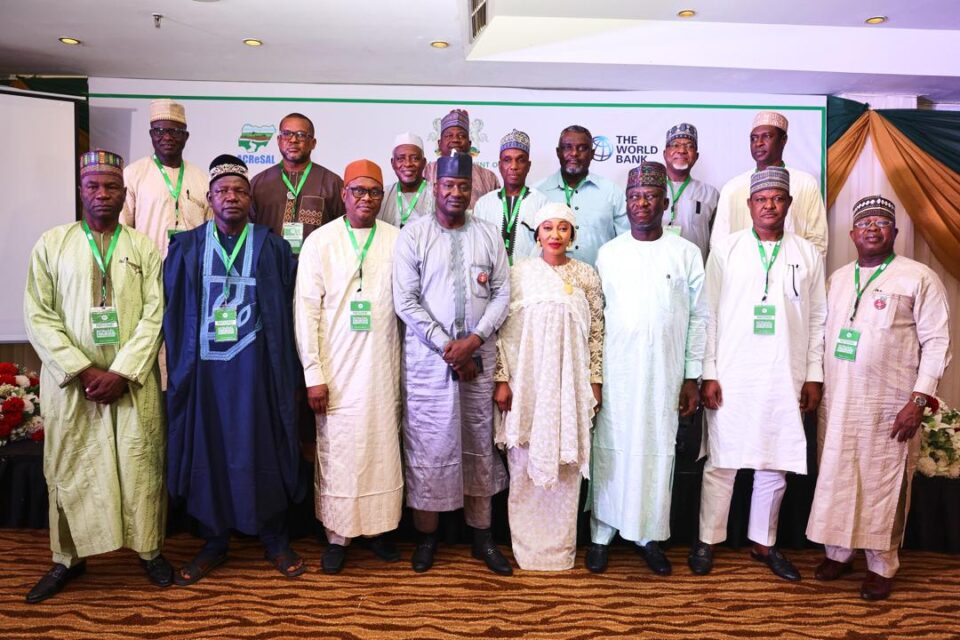By Chuks Oyema-Aziken
The Permanent Secretary, Federal Ministry of Environment, Alhaji Mahmud Adam Kambari has urged technical experts to ensure the concern of all actors and non-actors alike are considered and integrated into the catchment development plans being developed by the Agro-Climatic Resilience in Semi-Arid Landscapes (ACReSAL).
Alhaji Kambari made the call during the technical session on the presentation and finalization of the first phase of the development of the Strategic catchment management plans (SCMP) for ACReSAL states in Abuja on Monday.
He noted that the ACReSAL Project has committed some funds from its loan received from the World Bank for the development of 20 Strategic Catchment Management Plans for the 19 Northern Nigeria States and the FCT implementing the ACReSAL Project.
“Interestingly, this is the first time the Nigerian government will be supporting the development of a catchment management plan of this magnitude.
He said the ultimate goal of ACReSAL’s Strategic Catchment Plan is to strengthen the entire country’s long-term enabling environment for integrated climate-resilient landscape management.
The Permanent Secretary explained that the catchment management plan is a document that illustrates the locations of all the resources and challenges found within a given watershed and then goes further to guide the integration of social and economic needs of the inhabitants of the catchment with natural ecosystems and the long-term use of natural resources within the catchment for the benefit of the present generation without compromising the possibility of the future generation meeting their needs through the use of the same resources.
“The plans elaborately and comprehensively bring out the structures and mechanisms for environmental cooperation and coordination as well as the development of social commitment and cohesion.
“It is in this light that ACReSAL commenced the process of developing the Strategic Catchment Management Plans based on which the Project hopes to deliver on its Project Development Objective which is to increase the implementation of sustainable landscape management practices in targeted watersheds in northern Nigeria and to strengthen Nigeria’s long-term enabling environment for integrated climate-resilient landscape management.
In his speech, Permanent Secretary, Federal Ministry of Agriculture and Food Security, Temitope Fashedemi noted that Nigeria experiences a diverse climate and is listed among the countries most exposed to climate risks.
“Due to recent climate risks and disasters (flooding, rainfall variability, deforestation, e.t.c), agricultural productivity has fallen in most parts of northern Nigeria. ACReSAL since inception is working to reverse the adverse effects of land degradation and other climate change problems which has closely aligned it with the vision and mission of the Federal Ministry of Agriculture and Food Security.
“The project has supported the ministry’s capacity to respond to the dual challenges of agricultural land degradation and climate change, through strategic partnerships and initiatives, ACReSAL has supported the integration of climate-resilient agricultural practices into national programs like the Nigerian Farmers Soil Health Card Scheme, and Climate Smart Agriculture Manual Development.
“Upgrade of National Soil Testing Laboratories and Conduct of Soil Fertility Evaluation are equally in the pipeline. This will enhance the ministry’s ability to sustainably improve food security, and safeguard rural livelihoods.
“The ministry, through the Department of Agricultural Land and Climate Change Management Services, has received support in Information Communication and Technology (ICT). The technological resources provided through ACReSAL project will enhance efficiency, improve data management and capacity to achieve the ministry’s goals.
“We will continue to leverage on this support to advance our mission and further improve our services. The impact of ACReSAL is also evident in the 19 northern states and FCT, where it has directly addressed the vulnerabilities of semi-arid landscapes.
“Through its interventions, degraded lands have been restored to agricultural productivity, providing critical support and livelihoods. The establishment of community-based strategic catchment management systems will empower local populations to sustainably manage their natural resources.
“Moreover, the project has improved water resource management, ensuring that farmers and communities have access to this essential resource even in times of drought. These achievements have not only enhanced food production but have also mitigated the effects of desertification and climate change.
In a goodwill message, Permanent Secretary, Federal Ministry of Water Resources and Sanitation, R.P Pheelangwa noted the power of collaboration to address the complex challenges facing the catchment area, from environmental degradation to socio-economic disparities.



